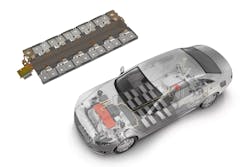Molex secures large-scale series production from BMW Group
Molex announced that luxury automaker, BMW Group, has selected its Volfinity Cell Contacting System (CCS) for its electric vehicles (EV) class.
In development since 2018, Volfinity delivers a reliable and easy-to-implement interface solution that connects cells to the control board in an electric vehicle battery module, eliminating the need for daisy-chained wires, per its maker. The total solution enables integrated cell-sensing features, cell monitoring and balancing, and temperature measurement functions, all designed to meet BMW Group’s functional-safety requirements. Molex leveraged in-house and partner design/production expertise to develop its deep cell-contacting system experience three years ahead of competitive interconnect suppliers through direct collaboration with plug-in hybrid EV and traditional EV makers, energy storage OEMs, and battery cell and battery pack suppliers, per the partners.
“Molex’s cell contacting system award is a testament to BMW Group’s commitment to driving comparative advantage through engineering innovation in the EV space,” said Steve Drysdale, VP and general manager, Molex Micro Solutions Business Unit. “Our global teams located in Singapore, China and Germany served as an extension of the BMW Group’s engineering teams, collaborating around-the-clock to provide rapid design iteration and problem resolution to innovate Volfinity to meet BMW Group’s unique requirements. Our dedication to the innovation process resulted in a transformational interconnect solution for the BMW Group, and we are thrilled to be chosen."
The recent BloombergNEF study shows that EVs currently comprise only 3% of car sales worldwide. By 2025, EVs are projected to reach 10% of global passenger vehicle sales and forecasted to grow to 28% in 2030 and 58% by 2040. The BMW Group’s growth projections are equally ambitious, they note. As adoption grows, ensuring scale and capacity to support demand-acceleration is vital.
